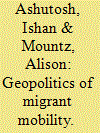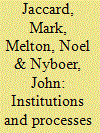| Srl | Item |
| 1 |
ID:
114252


|
|
|
|
|
| Publication |
2012.
|
| Summary/Abstract |
Following Japan's successful attacks against Allied targets throughout the Far East and the Pacific in December 1941, Canada focused on protecting its own Pacific coastline in British Columbia, participating in joint US-Canadian defence measures as required. Canadian authorities removed all Japanese Canadians from the Pacific Coast, placed conscript troops in British Columbia, and searched for other enemies in the province. They investigated subversion and sought to avert coastal attacks, whilst Japan conducted nuisance raids and maintained a presence in the Aleutians. Recently declassified intelligence files show that several factors influenced the way in which Canadian authorities viewed 'the enemy within' and 'the Pacific threat'. During the Pacific War, the Canadian conscription policy, public complacency, wartime allegiances and enemy activity along the coast all impacted the way in which security intelligence was collected and interpreted in British Columbia.
|
|
|
|
|
|
|
|
|
|
|
|
|
|
|
|
| 2 |
ID:
157576


|
|
|
| 3 |
ID:
113520


|
|
|
|
|
| Publication |
2012.
|
| Summary/Abstract |
This paper highlights how states attempt to control migrant mobilities through refugee claims. We examine the representations and practices of refugees in the refugee claimant process over time and in very different cases with distinct geopolitical influences and inflections in Canada. Our paper is based on case studies of Sri Lankan Tamil migrants in Toronto and refugee claimants from Fujian province, China, that landed in British Columbia in 1999. We analyse the ways that geopolitics influence every phase of the refugee claimant process, from the representations of claimants, to the decisions made about refugee claims, and the tenor of mundane encounters with state authorities. Our findings indicate that the geopolitics of migrant mobilities are produced through everyday state practices as well as by migrant strategies to move and resettle.
|
|
|
|
|
|
|
|
|
|
|
|
|
|
|
|
| 4 |
ID:
105824


|
|
|
|
|
| Publication |
2011.
|
| Summary/Abstract |
The dramatic scale-up of renewable energy over the coming decades is likely to pose significant challenges for coordinating land use allocation, environmental assessment, energy system planning and the design of greenhouse gas abatement policy. Of particular concern is the establishment of institutions and processes that enable consideration of multiple objectives and attributes, with adequate representation of affected interests, and without resulting in excessive delays in the development of renewable energy as part of a greenhouse gas abatement strategy. This paper uses the Canadian province of British Columbia as a case study for describing these challenges and the responses of policy makers seeking to rapidly scale-up renewables. Using evaluative criteria to assess this experience, we identify lessons that may be applicable to other jurisdictions seeking to quickly expand the production of renewable energy. These lessons include the design of institutions and processes that would likely be required in almost any jurisdiction with similar aims.
|
|
|
|
|
|
|
|
|
|
|
|
|
|
|
|